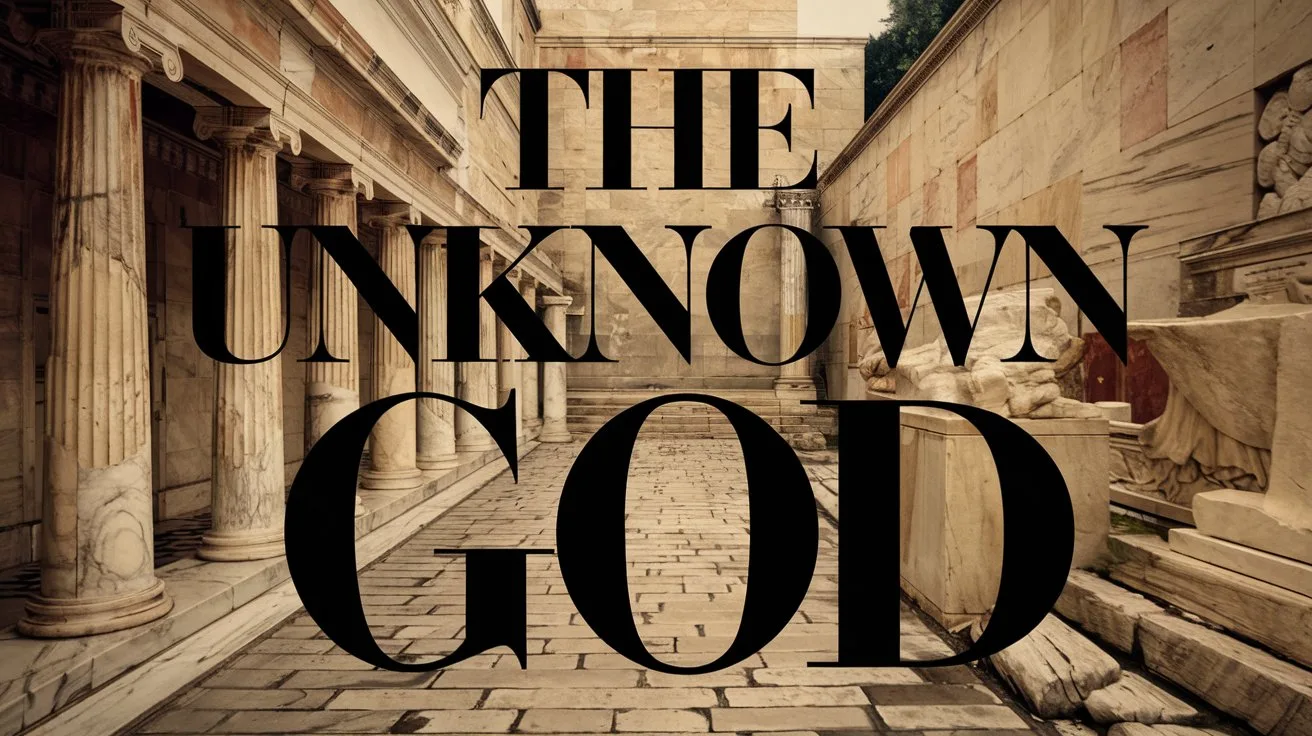When the Apostle Paul traveled to Athens, he found a city consumed with idol worship. The Greeks prided themselves on their philosophy and religious devotion, yet in their attempt to cover all possibilities, they had erected an altar to an “Unknown God.”
This moment in Acts 17 is one of the most powerful examples of evangelism in the Bible. Paul used their own altar as a bridge to introduce them to the one true God: the Creator of all things. His speech reveals deep truths about how God has made Himself known to humanity and answers an important question: What about those who have never heard the Gospel?
Paul in Athens: A City Given to Idols
After being forced to flee from Thessalonica and Berea, Paul arrived in Athens, the cultural and intellectual center of the Greek world.
“Now while Paul waited for them at Athens, his spirit was provoked within him when he saw that the city was given over to idols.” (Acts 17:16)
Paul was deeply grieved by the idolatry surrounding him. Athens was home to temples, shrines, and statues dedicated to countless gods—Zeus, Athena, Apollo, and many others. The people prided themselves on their religious knowledge, yet they were completely ignorant of the one true God. As Paul walked through the city, he found an altar that stood out from the rest (one dedicated “To the Unknown God.”)
“Then Paul stood in the midst of the Areopagus and said, ‘Men of Athens, I perceive that in all things you are very religious; for as I was passing through and considering the objects of your worship, I even found an altar with this inscription: TO THE UNKNOWN GOD. Therefore, the One whom you worship without knowing, Him I proclaim to you.’” (Acts 17:22-23)
Who Was This “Unknown God”?
The Athenians had many gods, but they feared they might have missed one, so they built an altar to an unnamed deity. They were superstitious, believing that if they left out a god, that god might be angry with them.
Paul seized this opportunity. Instead of immediately condemning them, he met them where they were. He took their own belief system and used it as a launching point to introduce them to the real God: not just another deity among many, but the Creator of heaven and earth.
Paul’s Sermon: Revealing the True God
Paul’s message at the Areopagus (Mars Hill) is one of the clearest explanations of God’s nature in all of Scripture.
God is the Creator of All Things
Paul begins by declaring that the true God is not an idol made by human hands but the sovereign Creator.
“God, who made the world and everything in it, since He is Lord of heaven and earth, does not dwell in temples made with hands.” (Acts 17:24)
Unlike their idols, the true God is not confined to a temple or altar. He created everything and rules over all.
God is the Giver of Life
“Nor is He worshiped with men’s hands, as though He needed anything, since He gives to all life, breath, and all things.” (Acts 17:25)
God does not need anything from us; we need Him. The very breath in our lungs comes from Him. The Greek gods depended on the people to build them temples and offer them food. But the true God is self-sufficient, sustaining all things.
God Created All People and Determined Their Boundaries
“And He has made from one blood every nation of men to dwell on all the face of the earth, and has determined their preappointed times and the boundaries of their dwellings.” (Acts 17:26)
This directly contradicts the Greeks’ belief that they were superior to other nations. Paul declares that all humans come from one ancestor (Adam). Nations rise and fall under God’s control.
God Has Made Himself Known So That People Might Seek Him
“So that they should seek the Lord, in the hope that they might grope for Him and find Him, though He is not far from each one of us.” (Acts 17:27)
God is not distant or unknowable. He has placed within every human heart a longing for Him. Even the Greeks, with all their false gods, were searching for something real.
Even Their Own Poets Recognized This Truth
“For in Him we live and move and have our being, as also some of your own poets have said, ‘For we are also His offspring.’” (Acts 17:28)
Paul quotes Greek poets to show that even their own literature acknowledges a higher reality. He is proving that they have always been searching for the true God without knowing Him.
God Commands All People to Repent
“Truly, these times of ignorance God overlooked, but now commands all men everywhere to repent.” (Acts 17:30)
For centuries, people worshiped false gods in ignorance, but now God has made the truth known through Jesus Christ. The call is not just for the Jews; it is for all nations to repent.
God Has Fixed a Day of Judgment Through Jesus Christ
“Because He has appointed a day on which He will judge the world in righteousness by the Man whom He has ordained. He has given assurance of this to all by raising Him from the dead.” (Acts 17:31)
The time for ignorance is over. Judgment is coming, and Jesus is the standard of righteousness. His resurrection is the proof that He is Lord.
What About Those Who Have Never Heard the Gospel?
Paul’s sermon answers the question of what happens to those who do not know about Jesus.
God Has Revealed Himself in Creation
Paul teaches that God’s existence is evident through creation.
“For since the creation of the world His invisible attributes are clearly seen, being understood by the things that are made, even His eternal power and Godhead, so that they are without excuse.” (Romans 1:20)
Nature itself testifies to God’s existence, leaving mankind without excuse.
God Has Placed a Desire for Him in Every Human Heart
Even among idol worshipers, there is a search for the divine. Ecclesiastes says:
“He has put eternity in their hearts.” (Ecclesiastes 3:11)
Every person has an inner longing for God, even if they do not yet know Him.
God Has Appointed a Time for the Gospel to Reach All People
Paul says that God determined when and where people live so that they might seek Him. This shows that God is actively working to bring people to the truth.
How Should We Respond?
Paul’s sermon teaches that everyone needs the Gospel. Some people will mock, some will delay, but some will believe.
“And when they heard of the resurrection of the dead, some mocked, while others said, ‘We will hear you again on this matter.’ However, some men joined him and believed.” (Acts 17:32-34)
Our job is to boldly proclaim the truth as Paul did. God has placed us in this time, in this world, to be preachers of righteousness.
My Final Thoughts
Paul’s encounter with the Unknown God reveals that God is not truly unknown. He has always been reaching out to mankind, and He has now revealed Himself fully in Jesus Christ.
For those who have never heard the Gospel, God is still calling them. Through nature, through conscience, through history, He is always calling people to seek Him. But now that Christ has been revealed, there is no excuse. The time for ignorance is over. The time for repentance is now.
May we, like Paul, boldly proclaim the true God to a world that is still searching for Him.





 Get the book that teaches you how to evangelize and disarm doctrines from every single major cult group today.
Get the book that teaches you how to evangelize and disarm doctrines from every single major cult group today.